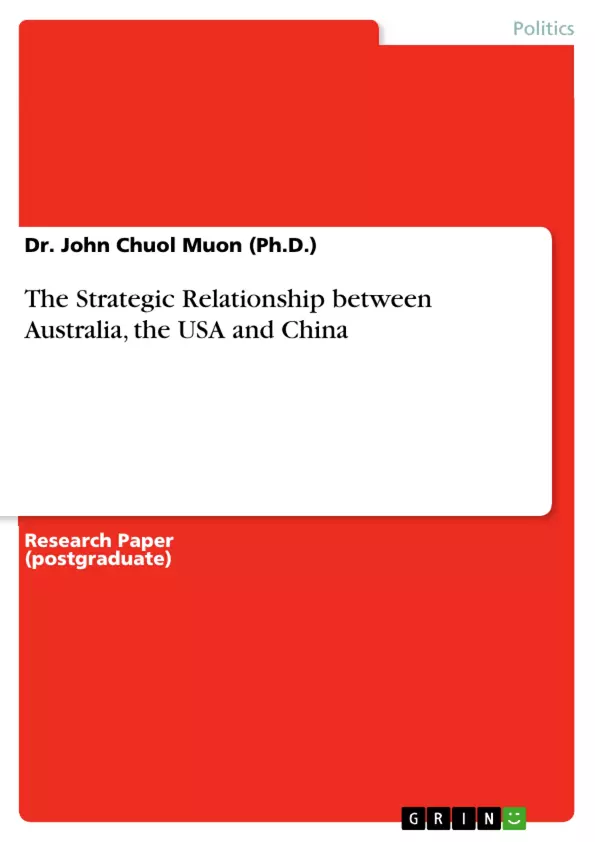This paper will examine Australia's Strategic relations to the USA, Australia’s Strategic relations to China, as well as the Strategic relations of the USA and China.
Australia’s security, economic and political ties with the United States are fundamental to Australia's future. The previous government significantly intensified Australia’s relationship with the United States, and it is now in the best shape it has ever been in. In this regard, the smoothness with which the US alliance has transferred to the Rudd Government, is outstanding to the strength of the alliance that John Howard had recognized with the United States of America. This is a permanent legacy that will help Australia and hopefully the government in greater strategic relationships. In the past eleven and half years, both defence and economic ties were improved, with the Australia-United States treaty of Defence Trade Co-operation and United States-Australia free trade agreement correspondingly. Therefore, the Australia-US relationship should only strengthen in the next ten years built on shared values, interest, mutual respect and similar outlooks on global affairs.
In this regard, I would argue that Australia at the moment is more dependent on China for its growing economy but initiatives such as the annual bilateral strategic dialogue between both Countries which the previous government initiated last year is an important step towards developing closer security links in the future. I am also confident that Australia escalating economic relationships with China will coincide with the greatest dialogue on security matters, which should reflect shared mutual interests and values. On the other hand, the United States have been building the security umbrella in Asia-Pacific after World War II, from Japan and South Korea in the North, to Philippine, Thailand, Australia and New Zealand in the South to protect its security and interests in Asia-Pacific from communist threats like communist China.
Inhaltsverzeichnis (Table of Contents)
- Introduction
- Body
- Australia-USA
- Australia-China
Zielsetzung und Themenschwerpunkte (Objectives and Key Themes)
This research paper explores the strategic relationships between Australia, the United States of America, and China. It examines the historical development, current state, and future prospects of these alliances, particularly focusing on their impact on Australia's strategic choices.
- The significance of the Australia-US alliance and its impact on Australian security, economic, and political interests.
- The growing economic and strategic relationship between Australia and China.
- The challenges and opportunities presented by the evolving dynamics between the United States and China, and their influence on Australia's foreign policy.
- The role of shared values, mutual interests, and strategic considerations in shaping Australia's approach towards its major partners.
- The implications of Australia's strategic choices for its regional and global security.
Zusammenfassung der Kapitel (Chapter Summaries)
The paper begins by examining the Australia-US alliance, highlighting its historical foundations, key agreements, and the importance of shared values and mutual interests. It analyzes the ongoing challenges and opportunities facing the alliance, particularly in light of the evolving security environment in the Asia-Pacific region.
The second part of the paper focuses on the Australia-China relationship, exploring the rapid growth of economic and trade ties, the emergence of political and strategic dialogues, and the development of a comprehensive strategic partnership. The section also examines the management of differences on issues such as human rights, climate change, and security concerns.
Schlüsselwörter (Keywords)
Australia, United States, China, Strategic Relations, Alliance, Security, Economic Ties, Trade, Foreign Policy, Asia-Pacific, ANZUS Treaty, Defence Cooperation, Human Rights, Climate Change, Strategic Partnership.
Frequently Asked Questions
How important is the US alliance for Australia?
The alliance with the USA is fundamental to Australia's security, economic, and political future, reinforced by treaties like ANZUS and free trade agreements.
What is the nature of Australia's relationship with China?
Australia is highly dependent on China economically due to trade, but faces challenges in balancing this with security concerns and political differences.
What was the "security umbrella" in the Asia-Pacific?
After WWII, the USA built a security network including Japan, South Korea, and Australia to protect its interests from communist threats.
Did the Rudd Government change Australia's US alliance?
The alliance transferred smoothly to the Rudd Government, maintaining the strength established during the Howard era.
How does Australia manage differences with China?
Australia uses annual bilateral strategic dialogues to manage security links while navigating issues like human rights and climate change.
- Quote paper
- Dr. John Chuol Muon (Ph.D.) (Author), 2020, The Strategic Relationship between Australia, the USA and China, Munich, GRIN Verlag, https://www.grin.com/document/1264808



